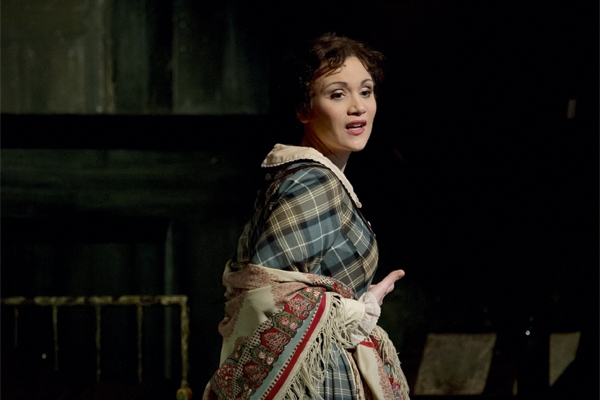Pharmaceutical considerations were uppermost in my mind as I made my way to the Barbican Hall for Philip Glass’s Einstein on the Beach, a production which began touring in Michigan in January and ends in Hong Kong next March. I imagine that marijuana is probably the best preparation and accompaniment for seeing it, but that makes me feel merely giggly and stupid, so I took a modafinil, primarily intended for shift workers, insomniacs and examinees, to aid concentration and combat sleeplessness, clearly an indispensable medicament for opera critics too. But in this case it didn’t work.
Einstein, which lasts about four and a half hours, has no interval, so the audience was invited to come and go as it felt fit. For the first hour no one stirred — I don’t recall any opera audience being so quiet. Then a couple got up and went out for refreshment or relief, and a trickle began, which I joined after approximately two hours. I was almost weeping, from the agonising monotony, the utter lack of any kind of interest in what we were seeing and hearing.
There is, of course, no ‘narrative’ in any old-fashioned sense, and over the 36 years of its existence many admirers of Einstein have shown incredulity that it should be expected. It purports to be, like its two successors, Satyagraha and Akhnaten, a portrait of an important person, but anyone who got an impression of Einstein from the eponymous opera would have unusual and not necessarily enviable gifts. In an interview in the programme, Glass tells us that ‘Bob [Wilson, the designer and director] and I are true children of Marcel Duchamp and the 1930s Surrealists and John Cage’. Anyone who sat through 15 minutes of Einstein wouldn’t need to be told that. If the aim is, as Glass says, to examine ‘the actual psychological arrangement in the relationship and transaction that takes place between the work and the viewer’ (hints here of Relativity? — I’m afraid there are) then we have already been over that ground quite profitlessly in the works of those named surrealists pioneers. Can Glass add anything? Not in the operas that I have seen.
Einstein begins with murmurings (numbers chanted randomly: otherwise ‘Knee Play 1’) from a small group, while a tirelessly smiling woman and a sterner man make gestures at a table, and a solo violinist takes his place between the main stage and the orchestra — he is in some sense Einstein. The stage gets fuller, the murmuring moves on to Christopher Knowles’s text, purveyors of movement — you can’t call them dancers — appear, walk to the front of the stage and back, and eventually a large locomotive very slowly comes into view. Shortly before I left, an Old Judge delivered a narrative-cum-sermon of feminist cast, not written by Knowles, who is differently verbally gifted. The strain of performing Einstein must be intense, since the least lapse in concentration would leave the performers wondering where everyone had got to.
The question remains: how did Einstein not only gain its 1970s appeal, playing to sold-out audiences in the New York Met, but also regain it, so that this worldwide tour gives every sign of being a success (it is running for a week at the Barbican, as few operas could)? I am at a complete loss for an answer. It lacks every quality that I and anyone I know goes to the opera for, and substitutes nothing worthwhile.
Tears of a different sort were in plentiful supply for the excellent revival of La bohème at the Royal Opera, John Copley’s production’s 25th outing. He returns, unlike almost all other directors, and always invents some new business, as well as taking the personalities of the new singers into account. The main new sources of attraction here were Semyon Bychkov’s broad and rich conducting, clearly that of someone addicted to Richard Strauss, Puccini’s lesser contemporary; and the Rodolfo of the Maltese Joseph Calleja and the Mimì of Carmen Giannattasio, an Italian. Calleja has a voice with a rapid vibrato, which I find tiring over an evening, but no one else in the audience seemed to. He is a stolid actor, while Giannattasio is an unusual Mimì in that it doesn’t seem with her, as it does with most performers of the role, that her natural state is death. She fights it, and if the price is a slightly unwieldy voice, sometimes with a sharp edge, that’s something I’m prepared to put up with for the integrity of her portrayal.
Every character is sharply delineated, and Act III, one of the great acts in all opera, was as moving as I have ever known it to be in the theatre. The more care and affection lavished on Puccini’s finest works, the more he repays them, which is not true of all composers. ‘This genius of sentimentality’ Stravinsky called him. But he is a genius.






Comments